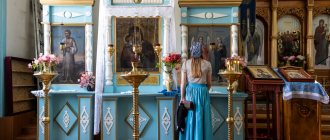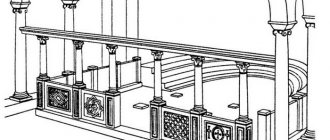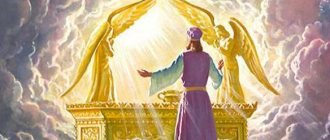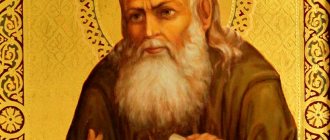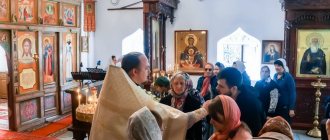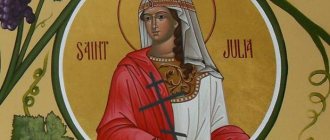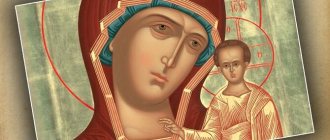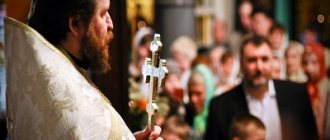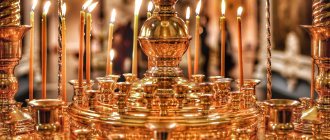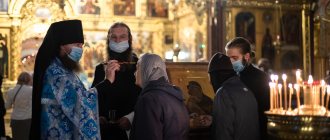Christian clergyman
| This article need additional quotes for verification . |
into the New Testament, and the presbyter
(Greek: Πρεσβύτερος: “elder”) - leader of the local Christian congregation.
The word comes from the Greek presbytera
meaning elder or elder.
Although many understand presbyter
to mean a bishop serving as an overseer,[1][2] in modern Catholic and Orthodox usage,
presbyter
is distinct from
bishop
and synonymous
with priest
.[3] In predominant Protestant usage,
presbyter
does not refer to a member of a special priesthood called
priests,
but rather a minister, pastor, or elder.
Etymology
The word elder
etymologically derived from Greek
πρεσβύτερος
(
presbyters
), comparative form
of πρέσβυς
(
presby
), "old man".[4]
However, although the etymological origin of the English word priest is presbyter,[5] the distinctive Greek word is (Greek: ἱερεύς Priest
), since "priest" is never used for presbyters/episcops in the New Testament, except insofar as it is part of the common priesthood of all believers,[6] with the first Christians making a distinction between Jewish and pagan priests and the shepherds of the New Testament.[7]
The ministry of the presbyter
If in relation to the five-fold ministry there are no clear rules about who to put in what ministry, then in relation to the elders there is a very precise indication. And not in one place, but in several. There are a lot of things we do in the meetings that we do (order of conduct, worship, preaching, youth ministry...) that are not so clearly defined in Scripture. And, in my opinion, this is due to the fact that the elder served specific people, and he bears responsibility for the people, and people trust him.
Story
The earliest organization of the Church in Jerusalem was, according to most scholars, similar to the Jewish synagogue, but it had a council or college of ordained elders (Greek: πρεσβύτεροι elders
[8]). In Acts 11:30[9] and Acts 15:22, we see a collegial system of government in Jerusalem, although headed by James, according to tradition, as the city's first bishop. In Acts 14:23, the Apostle Paul ordains elders in the churches he founded.
The term presbyter was often not yet clearly distinguished from the term overseer (ἐπίσκοποι episcopes
, later used exclusively as meaning bishop), as in Acts 20:17, Titus 1:5–7[10] and 1 Peter 5:1.[11][12][13] The earliest writings of the Apostolic Fathers, the Didache and the First Epistle of Clement For example, show that the church used two terms to designate local church offices - elders (many consider them an interchangeable term with bishop or overseer) and deacon.
In Timothy and Titus, a more clearly defined episcopate can be seen in the New Testament. We are told that Paul left Timothy in Ephesus and Titus in Crete to oversee the local church (1 Tim 1:3 and Titus 1:5). Paul commands them to ordain elders/bishops and exercise general supervision, telling Titus to “rebuke with all authority” (Titus 2:15).
Early sources are unclear, but various groups of Christian congregations would have had a group or college of overseer elders acting as leaders of local churches.[14] Eventually, the head or "monarchical" bishop began to rule more clearly,[15] and all local churches would eventually follow the example of other churches and model themselves after others with a single bishop to a greater extent,[14] although the role of the body of priests remained important.[15]
From the 2nd century There is no doubt that the ranks of bishop and presbyter were clearly distinguished, the bishop was understood as the chairman of the council of presbyters, and therefore the bishop was distinguished both in honor and prerogative from the presbyters, who were considered derivatives of the presbyters. power through delegation from the bishop.[ citation needed
] Each Episcopal see had its own bishop, and his presence was necessary for the consecration of any meeting of the church.[
citation needed
]
Eventually, as Christendom grew, individual communities were no longer served directly by the bishop. The bishop in a large city (Metropolitan bishop) appointed a priest to be the shepherd of the flock in each congregation, acting as his representative.[ citation needed
]
The fourth century scholar Jerome (347–420) stated:
“Consequently, an elder is the same as a bishop, and before this, at the instigation of the devil, competitions arose regarding religion, and people began to say: I am Paul, and I am Apollos, and I am Cephas, the churches were governed by a common council of elders. But after everyone had become accustomed to consider those whom he baptized as his disciples, and not Christ, it was decreed throughout the whole world that the chosen one from among the elders should be placed over the others... Therefore, how can elders know that according to the custom of the church they obey the one who was placed over them; Likewise, bishops can understand that they are greater than presbyters more by custom than by custom. the true decree of the Lord."[16]
Slightly different versions (quoting John Calvin) express the same thing.[17][18][19]
And the Catholic explanation suggests that the delegates were bishops in the truest sense of the word, but they had neither a fixed see nor a special title. Since they were largely itinerants, they entrusted the fixed necessary functions pertaining to the daily life of the community to the care of some of the most educated and respected converts.[15]
Along with this, presbyters/bishops were clearly given the title "priest". Writer Greg Dews, author of Catholic Customs and Traditions
, states that "the priesthood as we know it in the Catholic Church was unheard of in the first generation of Christianity because at that time the priesthood was still associated with animal sacrifice in both the Jewish and pagan religions." “When the Eucharist came to be seen as a sacrifice [following the theology of Rome], the role of the bishop took on a priestly significance. By the third century, bishops began to be considered priests. Presbyters or elders sometimes replaced the bishop in the Eucharist. at the end of the third century people everywhere used the title "priest" (hierus in Greek and sacerdos in Latin) for the one who presided over the Eucharist."[20]
With the legalization of Christianity and the threat of extinction of paganism over time, the word priest was borrowed from presbyter; as they felt that their faith could no longer be mixed with the ideas, philosophy and culture of the Roman religion.[21][22][ circular link
]
In the Russian Orthodox Church[ | ]
According to the current church law in the Russian Orthodox Church, it is required that a presbyter complete a course of theological education at a theological academy or seminary; Only as an exception is it allowed to admit trustworthy deacons who have not completed the course, as well as secular persons who, in an exam with the bishop, have proven the sufficiency of their knowledge of theology, to become presbyters.
Morally, a candidate for eldership is required to have impeccable behavior. The age for entering the presbytery was determined back in the 4th century. - 30-year-old[6]. This rule, which was often deviated from, was confirmed by the Holy Synod in 1869. In physical terms, physical defects are not considered an obstacle to the priesthood, with the exception of those that serve as an obstacle to the proper performance of priestly duties (deafness, blindness, etc.). In 1885, it was allowed to ordain elders without first passing through lower positions in the clergy. Only an Orthodox Christian can be the wife of a presbyter. In ancient times, marriage was not obligatory for a presbyter, but there was no compulsion to celibacy. Since the advent of heresies, Strigolniks and Judaizers, unmarried people (except for monks) were not ordained presbyters. The rules currently in force (since 1869) allow the elevation to elders of both those widowed after their first marriage and unmarried people who have declared a desire to remain celibate forever.
The procedure for consecrating a presbyter is found in the Official of Episcopal Priesthood[7].
Modern use
See also: Holy orders
The Roman Catholic Church, the Orthodox Church, the non-Chalcedonian churches, and similar groups usually refer to elders in English as priests ( priest
etymologically derived from Greek
presbytera
via Latin
presbyter
). However, collectively their "college" is referred to as a "presbytery", "presbytery" or "presbytery".
This use is seen by most Protestant Christians as stripping the laity of their priestly status, while those who use the term defend its use by saying that although they believe in the priesthood
(Greek ἱερεύς
Priest
is a completely different word used in Rev. 1:6, 1 Pet. 2:9) of all believers, they do not believe in
the eldership
of all believers. This is generally true for United Methodists, who ordain elders as clergy (pastors), affirming the priesthood of all believers. The Methodist Church of Great Britain has officially referred to its elders as such (rather than the common title of "minister") since 1990, when it became possible to be ordained as a Methodist. deacon, which is also an order of the Methodist ministry. The evangelical (or ultra-low church) Anglican Diocese of Sydney has abolished the use of the word "priest" for those ordained. Now they are called "elders." Presbyterians sometimes call their ruling elders and teachers (ministers) elders.
The International Standard Version of the Bible, Protestant translation, responds to criticism of the use of "elder" over "priest" as follows:[23]
No Greek lexicons or other scholarly sources suggest that "presbyteros" means "priest" rather than "elder." The Greek word is equivalent to the Hebrew zaqen, which means "elder" rather than priest. You can see the zakenim described in Exodus 18:21–22 using some of the same equivalent Hebrew terms that Paul uses in GK 1 and 2 Timothy and Titus. Please note that we will not
priests (i.e. from the tribe of Levi), but these are rather people of special maturity, which gives them the right to serve roles among people.
Therefore, the new equivalent of the zakenim cannot be a Levitical priest. Greek elders
(literally, a comparative Greek word meaning "old" and hence translated as "one who is older") thus describes the characteristic qualities
of episkopos
.
Thus, the term "elder" may describe a character, while the term "overseer" (since it is a literal translation of episkopos
) means a description of the position.
Presbyterianism
Among the many directions of Protestantism, there is one that took its name from the rank of elders - Presbyterianism.
Anyone who is interested in the question of what the Presbyterian Church is will have to turn to the teachings of the French theologian John Calvin, which formed the basis of the teachings of this denomination. It was his rethinking on the soil of Scotland that gave birth to it.
The main feature of Presbyterianism was the absence of episcopacy. This denomination is organized according to the congregational principle:
- Parishes are led by pastors and a council of elders.
- Several parishes make up presbyteries.
- General synods, which are the highest governing body, are formed by representatives of the presbyteries.
In this denomination, elders are called not only the pastors who lead the community, but also the elders elected by it and those in charge of financial and administrative matters.
The elders are assisted by deacons. Thus, the Presbyterian Church is devoid of such a strict hierarchical principle typical of Orthodoxy, Catholicism or Lutheranism.
Although the first Calvinists appeared in the Muscovite kingdom back in the 16th century, real Presbyterianism appeared in the Russian Empire in the middle of the 19th century. In 1860, the US missionary Easton and the Turkish preacher Kashamosh organized the first Presbyterian communities in the Yerevan province, which gradually grew throughout the empire.
Important! The most powerful Orthodox prayers for all occasions
Today, Presbyterianism is represented in most regions of Russia, especially strongly in Moscow and St. Petersburg. The communities of the northern capital are united by the Council of Pastors of Presbyterian Churches of St. Petersburg, which is an unregistered coordinating body.
Recommendations
- Cottrell, Jack (2002). Faith Once and For All: Biblical Teaching for Today
. Joplin, MO: College Press Pub. item 419. ISBN 0899009050. - Bromiley, Geoffrey W. (1979). International Standard Bible Encyclopedia
.
1
(Completely revised. Ed.). Grand Rapids, MI: W. B. Eerdmans. item 516. ISBN 978-0802837813. - “Where in the New Testament is a priest mentioned.” Catholic Answers
. Catholic answers. Retrieved 2018-09-01. - "Henry George Liddell, Robert Scott, Greek-English Lexicon, πρέσβυ^". tufts.edu
. Retrieved August 31, 2015. - Webster's New World Dictionary of the American Language
, College Edition, The World Publishing Company, Cleveland OH, s.v. "priest" - Buchanan, Colin (22 October 2015). Historical Dictionary of Anglicanism
(Second ed.). Rowman & Littlefield Publishers. item 483. ISBN 978-1442250154. - Knox, Ronald A. (2003). Hidden flow
. San Francisco: Ignatius Press. p. 181. ISBN 978-0898708639. - "presbuteros". Bible Center
. Retrieved February 21, 2016. - Acts 11:30
- Titus 1:5–7
- 1 Peter 5:1
- Oxford Dictionary of the Christian Church, 1997 edition, revised 2005, p. 211: "It seems that at first the terms 'bishop' and 'presbyter' were used interchangeably..."
- Cambridge History of Christianity, Volume 1, 2006, "There is general agreement among scholars that at the turn of the first and second centuries, local communities were led by bishops and presbyters whose offices were the same or indistinguishable from each other."
- ^ a b
O'Grady, John.
The Roman Catholic Church: Origins and Essence
. paragraph 140. - ^ a b c
Van Hove, A. (1913).
"Bishop". In Herbermann, Charles (ed.). Catholic Encyclopedia
. New York: Robert Appleton Company. - Catholic World, Volume 32
. Paulist Fathers. 1881. pp. 73, 74. Cf. Jerome, Letter 146 to the Gospel - Hall, Edwin (1846). The Puritans and Their Principles
. New York: Baker and Scribner. pp. 345, 346. - Bailey Adger, John (1899). My life and times
. Presbyterian Publications Committee. p. 247. ISBN 978-1344733878. Retrieved February 21, 2016. - Harrison, John (1867). Whose Fathers?: Or the Doctrine of Some Anglo-Catholics
. Longmans, Green. p. 488. ISBN 9785878932493. - Fees, Greg (1992). Catholic customs and traditions: a popular guide
(Revised and additional ed.). Mystic, Connecticut: Twenty-Third Publications. item 166. ISBN 978-0896225152. - https://www.christianitytoday.com/history/issues/issue-27/perfection-in-early-church-did-you-know.html
- Constantine the Great and Christianity
- "Elders". Archived from the original on November 5, 2011. Retrieved January 6, 2013.
Notes[ | ]
- Saint Simeon, Archbishop of Thessalonica.
144. About the presbyter // The wisdom of our salvation. - M.: Blagovest, 2010. - 640 p. - Jewish community. Ancient period. // Electronic Jewish Encyclopedia
- Gotskalyuk D. Local councils of the Jerusalem Church // Pravoslavie.ru, 02.02.2002
- Hieromartyr Cyprian of Carthage. Letters
- Hieromartyr Ignatius of Antioch. Message to the Thrallians
- Archbishop Simeon of Thessaloniki writes: He is called a presbyter because he is, that is, the oldest, who has come out of adolescence and is likened in years to Christ.
- Bishop's official. Book 1. The rite performed at the ordination of a presbyter
As a conclusion
Unfortunately, today many congregations are moving away from the biblical form of ministry and management. New ministries appear (leader, missionary), new rules and requirements for ministers appear. As I said at the beginning, everyone himself will answer before God for his attitude towards the Word. For the way you confess His Word. How you teach.
It is very easy to misinterpret another person's words. But we touch the Word. The disciples MADE A CONCLUSION BASED ON THE WORDS OF Christ. But we see a correction - Jesus DIDN'T SAY what the disciples claimed.
Who ordains?
Scripture shows us Paul and the one to whom he entrusted this responsibility - Titus. He also writes about this to Timothy. Paul served as an apostle. Timothy is also spoken of as an apostle. Titus carried out various assignments from Paul related to the donation and care of churches. Even in the book of Acts it is said that Paul and Barnabas, the apostles, ordained elders.
So, the Apostles and those people whom they appointed as caretakers of churches could ordain elders who met certain criteria.
Ordination of an elder
So, we see that such qualities of an elder should be visible to everyone. It is very important. Today's practice of appointing ministers in churches (for some reason, pastors) shows that people are sometimes appointed from the outside, whom the congregation does not know. Those who have completed certain courses and have a certificate are awarded. Or simply the husband or wife of a minister automatically becomes a minister. In one of the denominations, the rule is to change the pastor every three years.
I do not want to consider or delve into such practices. Our task is to see how the Word speaks. And to be obedient to Scripture or human traditions is the choice of every person.
